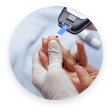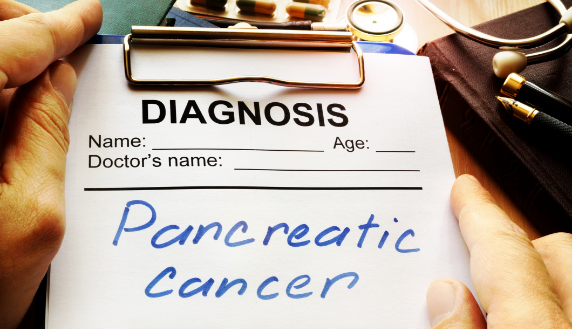Cancer of the pancreas develops from changes in the genetic code of the cells in the pancreas. Various parts of the pancreas can develop pancreatic cancer, but about 70% of pancreatic cancers occur in the head of the pancreas.
More than 95% of pancreatic cancers are adenocarcinoma. Adenocarcinoma is a cancer that begins in the cells that line the pancreatic ducts. Other cancers such as Neuroendocrine tumours (NETs), lymphomas or metastases organ from other cancers of other organs can also occur in the pancreas. Among all cancers, pancreatic cancer ranks fifth in terms of mortality. In the case of pancreatic cancer, the five-year survival rate is 11%.
Early stage pancreatic cancer usually has no symptoms until the disease is advanced. Several symptoms may be present:
Characterised by yellowish discoloration of the skin and eyes, as well as dark urine
(10-20% of people with pancreatic cancer develop diabetes).







The following tests can be used to diagnose pancreatic cancer:

Blood Tests
Targeted blood tests are performed to help determine treatment options.

Endoscopic Ultrasound
A safe and minimally invasive method that uses sound waves to visualise the pancreas and surrounding area to determine whether a tumour is present. One of the most effective tools for diagnostic and therapeutic interventions in the management of pancreatic cancer.

CT Scan
CT (computerised tomography) scans are used to obtain multiple images of the inside of the body using x-rays.

MRI
In MRI (magnetic resonance imaging), magnetic waves create a detailed image of the pancreas and surrounding organs.

PET Scan
During PET (positron emission tomography), a small amount of radioactive material is injected to highlight any tumours present.

Tissue Sampling Tests
Testing for tissue samples includes fine-needle aspiration (needle biopsy), laparoscopy, and endoscopy.
Your tests will be determined by the symptoms, type, and stage of your cancer.
When you receive a diagnosis of pancreatic cancer, you may feel shocked, upset, anxious, or confused. These are normal reactions. Each person is affected differently by a diagnosis of pancreatic cancer. It will be a difficult time for the majority of people. However, some individuals manage to continue with their regular daily routines.
Talking with your doctor, family, and friends about your treatment options may be helpful. Please feel free to ask as many questions as possible to obtain as much information as possible. Whether or not you wish to be involved in the decision-making process for your treatment is entirely up to you.
A disease's prognosis refers to its expected outcome. Your physician can provide you with information about your prognosis and treatment options. You must consider your test results, the type, stage, and location of cancer, as well as other factors such as your age, fitness, and medical history.
Most pancreatic cancers are not detected until they are advanced, as symptoms may be vague or go unnoticed initially. The prognosis can be excellent if the cancer is detected early and removed surgically.
SJMC Cancer & Radiosurgery Centre has been recognised for its leadership in cancer management.
The staff members and doctors at the centre are dedicated to providing the best possible care for each patient and aim to enhance the patient's emotional and physical well-being. The facility also offers various support groups and other services to help ease the daily stress of living with cancer.








